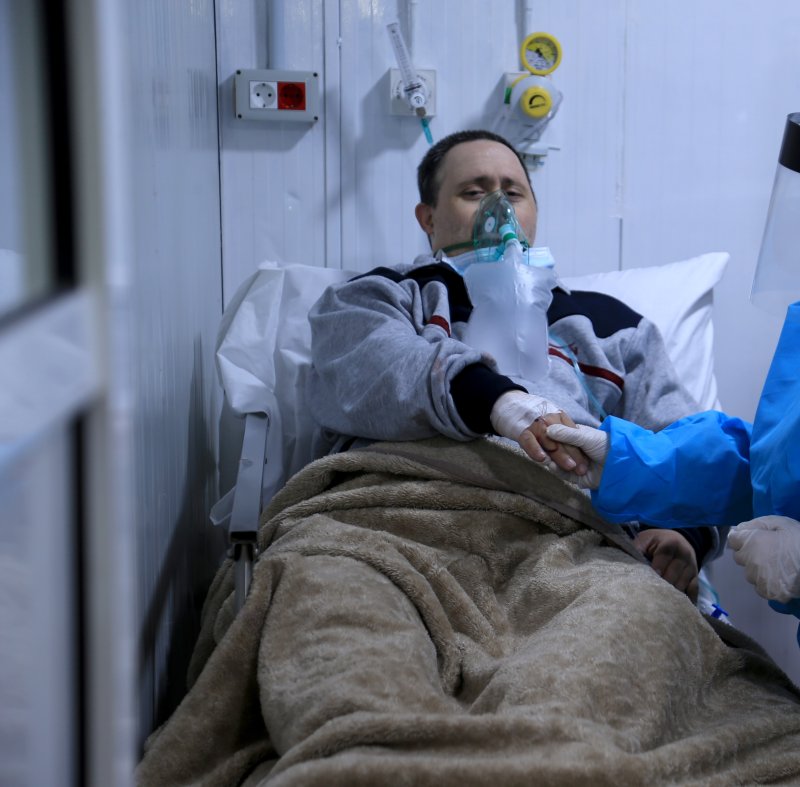Monoclonal antibody treatment significantly reduces hospitalizations and deaths from COVID-19, according to a study of Native Americans in Arizona. File Photo by Nabil Mounzer/EPA-EFE
Sept. 21 (UPI) -- Treatment with monoclonal antibodies reduced the need for hospital care in adults at high risk for serious illness from COVID-19, a study published Tuesday by JAMA Network Open found.
Just over 17% of high-risk Native Americans given the treatment based on laboratory-created antibodies, or immune proteins that fight off infections, within days of testing positive for the virus were admitted to the hospital, the data showed.
However, 43% of patients in the study who did not receive monoclonal antibodies required hospital treatment.
In addition, more than 4% of the untreated patients were admitted to a hospital intensive care unit because of COVID-19, and nearly 3% died from the disease.
None of the patients given monoclonal antibodies were admitted to the ICU and none died, they said.
The findings are from the Whiteriver Service Unit, a rural, Indian Health Services acute care facility that serves as the primary hospital and public health department on the Fort Apache Indian Reservation in eastern Arizona.
While they point to a "significantly lower proportion of deaths among patients receiving monoclonal antibodies" for COVID-19," the researchers noted the limited population included in the study and that others may not have access to similar services.
However, "our results are generalizable -- these medications work and work well," study co-author Dr. Ryan Close told UPI in a phone interview.
"There's no reason to think that if you give these medications to people with COVID-19 early and effectively that they won't work," said Close, who is director of preventive medicine at Whiteriver.
In the study, all treatments were administered within one to three days of participants' positive COVID-19 tests, and generally within two days of symptom onset, according to Close and his colleagues.
All of the participants were unvaccinated, as the study was conducted earlier this year, before the COVID-19 shots were widely available, Close said.
Monoclonal antibody therapies, which use laboratory-made antibodies modeled after those created by the immune system in response to viruses, prevent progression to serious illness if they are administered before an infected person develops severe symptoms, studies suggest.
Based on these findings, the Food and Drug Administration has granted emergency use authorizations for several monoclonal antibodies, including the widely used REGEN-COV, made by Regeneron, to treat COVID-19.
Still, these treatments are more expensive than vaccines -- because the proteins have to be grown in the lab -- and can only be administered after someone is infected, according to Johns Hopkins University.
As part of the Indian Health Service, patients at Whiteriver do not get billed for medical services, which are covered under the program -- administered under the auspices of the Department of Health and Human Services -- for qualifying tribal members, Close said.
For this study, he and his colleagues assessed the impact of monoclonal antibody treatment in nearly 500 Native Americans considered to be at high-risk for severe COVID-19 due to age or prior chronic health conditions, such as diabetes, high blood pressure and lung disease.
Just over 200 of the study participants were treated either with the monoclonal antibody bamlanivimab or the combination treatment REGEN-COV -- which includes the antibodies casirivimab and imdevimab -- based on symptom severity, while the remainder received other care approaches, according to the researchers.
Those not given the treatment were generally younger and had fewer chronic health conditions, the researchers said.
Nearly half -- 49% -- of the participants who did not receive monoclonal antibodies went to the emergency room or were admitted to the hospital due to COVID-19 within 30 days of diagnosis, compared to just under 30% of those given the treatment, the data showed.
Of those hospitalized, about three-quarters of participants in both groups required oxygen support to maintain breathing, the researchers said.
Both groups of patients spent an average of four days in the hospital, according to the researchers.
"Monoclonal antibodies could play an important role as new virus variants emerge, particularly for people who can't get vaccinated due to medical reasons," Close said.
"Getting vaccinated is the best option, to avoid getting sick, but having these medications on the shelf for those who do get infected will save lives," he said.















